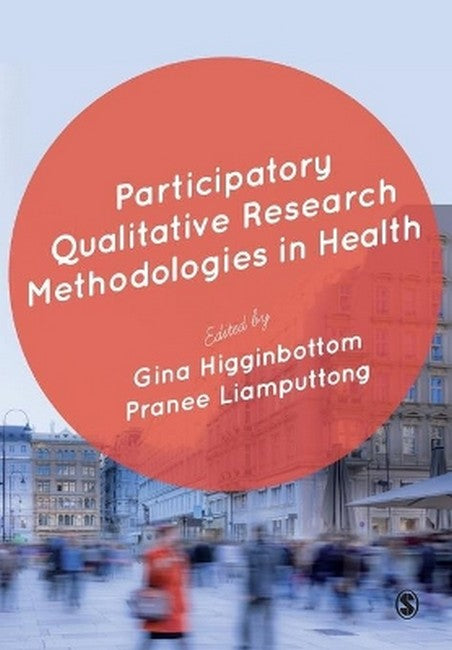Gina Higginbottom holds a Tier II Canada Research Chair in Ethnicity and Health and is Professor in the Faculty of Nursing, at the University of Alberta. Gina's research portfolio focuses on ethnic minority populations and immigrant health using participatory models of research and ethnography. She has a particular focus on the broad issue of social exclusion and equity in health care, lay understandings of health and illness. A second theme in her research portfolio has focused on maternal health and well being including parenting issues, early parenthood and postnatal depression in different ethnic minority groups. Gina has been Principal Investigator on 17 nationally and internationally funded qualitative research studies, currently she holds three Canadian Institute for Health grants. Gina is Assistant Editor of Ethnicity and Health journal and co-chair of the IIQM's 2013 Thinking Qualitative Conference 2013 and an Affiliate Scholar of IIQM as well as an advisory board member of IIQM. Gina is an experienced educator with a professional teaching qualification who has facilitated many undergraduate, graduate and doctoral programs in the UK and Canada. Pranee Liamputtong is a medical anthropologist and holds a Personal Chair in Public Health at the School of Public Health, La Trobe University, Melbourne, Australia. Pranee has her interests in issues regarding childbearing, childrearing, and women's reproductive and sexual health. She has conducted research with migrant and refugee women in Australia and with women in Southeast Asia. She has published several books and a large number of papers in these areas. Her recent books in the health and social science areas include: The Journey of Becoming a Mother Amongst Women in Northern Thailand (Lexington Books, 2007); Community , Health and Population (with Sansnee Jirojwong, Oxford University Press, 2008); Infant Feeding Practices : A Cross-Cultural Perspective (Springer 2011); Motherhood and Postnatal Depression : Narratives of Women and Their Partners (with Carolyn Westall, Springer, 2011); and Health , Illness and Well -Being : Perspectives and Social Determinants (with Rebecca Fanany and Glenda Verrinder, Oxford University Press, 2012). She has recently edited two books on HIV/AIDS for Springer including Women, Motherhood and HIV /AIDS: A Cross -Cultural Perspective and Stigma, Discrimination and HIV /AIDS: A Cross-Cultural Perspective. Both were published in 2013. Pranee is a qualitative researcher and has also published several method books. Her most recent method books include: Researching the Vulnerable : A Guide to Sensitive Research Methods (Sage, 2007); Performing Qualitative Cross-Cultural Research (Cambridge University Press, 2010); Focus Group Methodology: Principles and Practice (Sage, 2011); Qualitative Research Methods , 4th Edition (Oxford University Press, 2013); and Research Methods in Health: Foundations for Evidence-Based Practice, 2nd Edition (Oxford University Press, 2013).
Request Academic Copy
Please copy the ISBN for submitting review copy form
Description
Chapter 1: What is Participatory Research? Why do it? - Gina Higginbottom and Pranee Liamputtong Chapter 2: Addressing Ethical Issues in PR: The Primacy of Relationship - Wendy Austin Chapter 3: Designing Participatory Research Projects - Helen Vallianatos, Emina Hadziabdic and Gina Higginbottom Chapter 4: Data Management, Analysis and Interpretation - Gina Higginbottom Chapter 5: Drawing Conclusions from Your Research - Gina Higginbottom and Sophie Yohani Chapter 6: Engaging Older People in Participatory Research - Pranee Liamputtong and Gina Higginbottom Chapter 7: Involving Children and Youth in Participatory Research - Diane Conrad, Bryan Hogeveen, Joanne Minaker, Mildred Masimira and Daena Crosby Chapter 8: Conceptualising Inclusive Research - A Participatory Research Approach with People with Intellectual Disability: Paradigm or Method? - Christine Bigby and Patsie Frawley Chapter 9: Diverse Ethno-cultural Groups and the Use of Participatory Research - Gina Higginbottom and Pranee Liamputtong Chapter 10: The Relationship Between Engaged Scholarship, Knowledge Translation, and Participatory Research - Sarah Bowen Chapter 11: Community-University Partnerships: A Case Study - Sherry Ann Chapman Chapter 12: Information and Communications Technologies and the Potentials for Participatory Research - Chris Atchison
With this delightful collection, Higginbottom and Liamputtong advance the art and science of collaborative community based action research. The wisdom in these pages derives from a deeply ethical commitment to social justice grounded in solidly informed and creative methodological technique. -- Sally Thorne Involving people and communities in research has never been as important or as challenging. This accessible and comprehensive step-by-step guide provides vital clarity and essential help to researchers across disciplines, methods and cultures. -- Alexander Clark This book offers an excellent introduction to participatory research. It guides the reader full circle from the historical roots to the implementation of findings. It covers project planning and organization, a detailed discussion of ethical issues, and issues around methods of data collection, data management and analysis. This is complemented by chapters on special topics like working with elderly, children and youth or ethno-cultural groups and the implementation of new technologies. I recommend the book for both the use in the classroom as well as for researchers who are interested in conducting participatory community research. -- Dr. Susanne Friese Engaging individuals, families and communities in the development of programs and services is increasingly important in our culturally diverse and pluralistic global community. This text provides crucial information for individuals hoping to make a difference and increase access to health care, particularly for marginalized and vulnerable populations. -- Patricia Davidson The book has a clear and understandable style: each chapter follows a set format, setting out aims, objectives, practical tips and recommendations. Short vignettes bring the text alive, with extensive bibliographies accompanying each chapter. -- Rosemary Lamport

